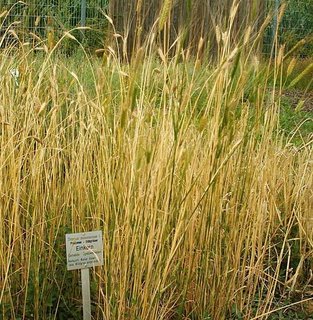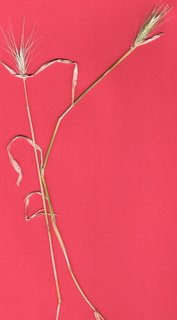
Today is the first day of Thermidor (from thermos meaning heat) in the French Republican calendar. The creators of the calendar sought to do away with the old religious and political associations of the calendar by assigning each day a plant, animal or tool. Today's plant is Einkorn Wheat, one of the ancestors of wheat, a wild grass that was partly responsible for the development of civilization as we know it
Here are a few of the interesting facts I learned while researching Einkorn:
- Einkorn was the first cultivated grain.
- The oldest evidence for the cultivation of this type of wheat comes from the slopes of a volcano in southeast Turkey, although it may have been developed in other places in the Fertile Crescent, including Syria, Palestine or Jordan.
- Civilizations first arose in these areas where people began cultivating wheat and other crops.
- Einkorn has more nutritional value than our modern varieties of wheat. However, it doesn't make good bread. It has the advantage of storing well (the husk is tough and prevents insect damage) but needs to be milled (to get rid of the husk) to be used in cooking.
 Paul Ehrlich in the Economist:
Paul Ehrlich in the Economist:http://www.economist.com/science/displaystory.cfm?story_id=5323362
Most wheat has six copies of each gene, where most creatures have two. Thus its 21 chromosomes contain 16 billion base pairs of DNA, 40 times as much as rice, six times as much as maize and five times as much as people.
Wheat is incapable of sowing itself and must rely on people to sow it.
All day today I've been admiring the wild wheat on my block which has sown itself quite capably and offering it praise for the many gifts it has given us. I scanned a picture of the plants I found on my morning walk.The top picture of Einkorn Wheat comes from Thomas Springer and was released by him into the public domain. I found it in on Wikipedia
http://en.wikipedia.org/wiki/Einkorn_wheat
No comments:
Post a Comment